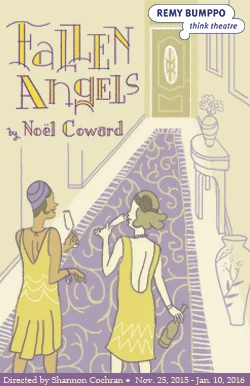Fallen Angels
Directed by Shannon Cochran
Produced by Remy Bumppo, Chicago
“O, the despicable squalor of it all.”
Fans of Noël Coward have had several chances to see the witty English satirist of sexual relationship’s masterpieces on stage this fall. Shaw Chicago is currently presenting a staged reading of Private Lives, which is about a mutually abusive couple who reunite after getting divorced and marrying other people, and Pride Films and Plays just closed Design for Living, which depicted a threesome slowly figuring out polyamory. However, Remy Bumppo, a company known as much for their interest in history as language, delves into Coward’s early career, and presents his slapstick comedy Fallen Angels. Written when he was twenty-three and first performed when he was twenty-five, this piece already contained a great deal of Coward’s wit. But it also opens with a joke about child molestation, and the centerpiece of the play is an extended scene in which two extremely drunk women wreck the house and fall over everything. Director Shannon Cochran’s production is quite funny; I’ve never laughed at a Coward play more. But it is an early work, and not quite what Coward fans might be expecting.
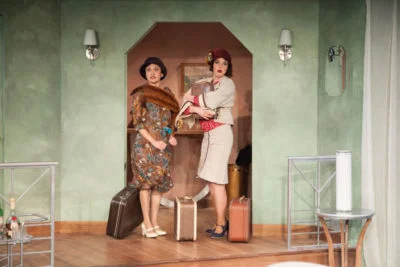
Julia (Emjoy Gavino) informs her husband, Fred (Fred Geyer) one morning that they love each other, but are not in love. He objects, but she tells him she had a presentiment of terrible things to come, and stands by her declaration. They are about to meet a married couple they’re friends with, Jane (Eliza Stoughton) and Willy (Jesse Dornan), and in truth, the male and female pairs get along with each other much better and spend more time together than they do with their spouses. Once the men are out for a golfing trip, Jane reveals that she, too, had a presentiment, and has received a card announcing the expected arrival of the Frenchman Maurice Duclos (Joshua Moaney). Julia and Jane both had sexual affairs with Maurice years ago, before they were married, and hope that his return could be just the thing to shake them out of their boredom.
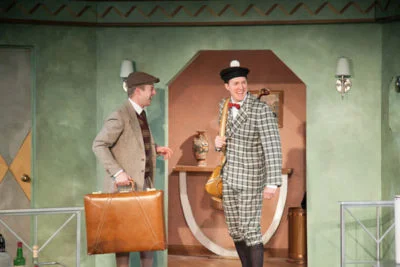
Julia also gets a postcard announcing Maurice’s arrival in England, and the women decide to wait for him at Julia’s house. However, they do not know exactly when he will arrive. Decked out in their evening wear to make a good impression, they soon get bored, and start drinking. This turns out to be a very bad idea. In the first place, they feel a little guilty about cheating on their husbands, who are boring, but not, so far as they know, unfaithful. The much bigger problem is that they soon become extremely jealous of each other. Neither trusts the other to be left alone with Maurice, and although they agree that they’ll go back to being friends after he leaves, their increasing drunkenness and frustration at all the evening’s false alarms soon wear down their last nerves and gravely imperils their friendship.
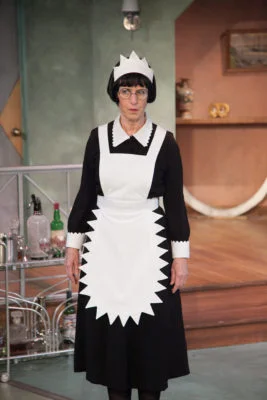
Julia’s new maid, Saunders (Annabel Armour), advises her that too many drinks never hurt, because after the first, the damage is already done. Armour’s deadpan performance as the infuriatingly knowledgeable servant is the most consistently hilarious part of the show. No matter the subject, Saunders previously worked for a master who was an expert on it. She can expound on everything from golf, to music, to medicine with much more authority than her current employers, and never misses a chance to do so. Saunders is so impassive it’s hard to tell whether she despises or is merely bemused by Julia and Jane, and she’s not the clever servant in the tradition of Roman comedies who fixes everybody else’s problems. But as the only mature person in the room, her judgmental perfectionism is always a welcome relief for the audience from the chaos that ensues whenever she is not present.
However, while Saunders’s advice may be true to life, it’s not necessarily the best way to stage conflict. I once took a directing class in which the teacher discussed the concept of “drinking the show,” which is a (thought) exercise in what would happen if actors were drinking real alcohol onstage. The result in Noël Coward’s plays would be that, instead of being witty sophisticates, the characters would be incoherent and disgusting within minutes. If there’s a problem in this production, and with Coward’s early experiment in comedic pacing, it’s that Julia and Jane’s decline is too sudden for the length of their drunk scene. Having reached the point of falling over furniture with every few steps and shrieking at each other early on, they have to sustain the same level for about half an hour of several more martinis and brandies. There’s plenty that’s funny in the scene—particularly their malicious fantasizing about their husbands as they lose their inhibitions—but before the end, the audience is as exhausted as the characters, and wishes they would just pass out already.
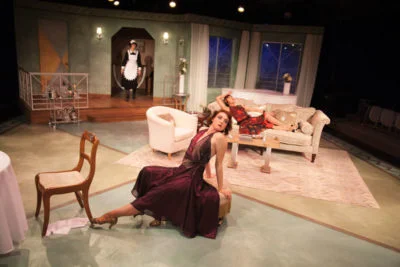
Overly realistic drunkenness aside, Cochran finds a lot of humor in this script. She even choreographed chuckle-worthy transitions, again involving Armour’s Saunders. Scenic designer Jeff Bauer and props designer Amanda Herrmann were limited by having to create a room that can be wrecked and rebuilt every night, but the glamour of the 1920s is still hinted at, and apparent in Janice Pytel’s costumes. Coward satirized lingering Victorian gender roles among the older members of his generation in Fallen Angels, but the main reason to see this play is for the slapstick. While showing rich jerks falling on their faces and getting cuckolded might not be the most mature social commentary, it is a relief in the context of so many other drawing room comedies in which rudeness and selfishness are treated as wit.
Recommended
Jacob Davis
[email protected]
Reviewed November 30, 2015
For more information, see Fallen Angels’ page on Theatre in Chicago.
Playing at the Greenhouse Theater Center, 2257 N Lincoln Ave, Chicago. Tickets are $42.50-52.50 with discounts for students and groups; to order, call 773-404-7336 or visit RemyBumppo.org. Performances are Thursdays through Saturdays at 7:30 pm, and Sundays at 2:30 pm, with select Wednesday evening and Thursday and Saturday matinees through January 10, 2016. Running time is two hours with one intermission.

